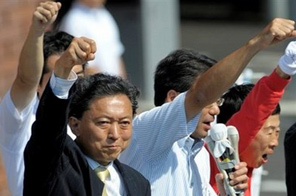Japan opposition likely to win poll
TOKYO: Two days before Japan's general elections, the embattled prime minister and the opposition challenger, who looks set to defeat him, made last-ditch appeals to rally voters on Friday.
New polls indicated that opposition leader Yukio Hatoyama and his Democratic Party of Japan (DPJ) are headed for a landslide victory over conservative Prime Minister Taro Aso and his Liberal Democratic Party (LDP).
The centre-left DPJ, seeking to end more than half a century of almost unbroken conservative rule, could win more than 300 seats in the 480-seat lower house in Sunday's election, the Yomiuri Shimbun said.
The daily, which questioned more than 85,000 voters this week, said there was a "strong likelihood of a change of government," with the ruling party unable to stop the "DPJ's overwhelming momentum."
The apparent groundswell of support for the DPJ reflects enthusiasm for its promise of change as much as voter dissatisfaction with the LDP and the leadership of gaffe-prone Aso amid tough economic times.
The government was dealt another blow on Friday when new data showed that, although Japan emerged from recession in the second quarter, unemployment rose to a post-war high of 5.7 percent in July.
Embattled Aso, campaigning in Oita, southwestern Japan, sought to highlight his party's experience against the as yet untested DPJ, which has promised higher social welfare spending and a politics focused on people.
"Some people are somehow looking for a big change, but politics is not a gamble. Its about people's lives," said the 68-year-old who took office less than a year ago as the third LDP premier in as many years.
Hatoyama, a US-trained engineering scholar who has led in polls for months, cautioned his supporters against complacency on the eve of the election while campaigning in Tokushima on the southwestern island of Shikoku.
"Things can change in a day or two if we let our guard down," said the 62-year-old party leader, the scion of a powerful and wealthy political dynasty who was once a member of the LDP.
Data suggested the turnout will be high in the lower house election.
More than three million voters had cast early ballots by last Sunday -- up 52 percent from the same period in the 2005 election, according to the internal affairs ministry.
Other polls on Friday also showed a strong lead for the DPJ, a broad and mixed coalition that includes both LDP defectors and former socialists.
Polling by Kyodo news agency found that 35.9 percent of respondents would back the DPJ in the proportional representation part of the ballot, in which voters chose a party rather than an individual candidate. This compared to 17.9 percent for the LDP, and 30.9 percent who were undecided.
In the vote for individual candidates, 36 percent said they would choose DPJ candidates against 22.6 percent who favoured LDP candidates, according to the survey with 1,229 responses carried out Wednesday and Thursday.
Another poll, by the Mainichi Shimbun, found 44 percent would vote for the opposition in proportional representation -- against 21 percent for the LDP, according to responses from 1,026 voters on Wednesday and Thursday.
When asked which party they supported, 39 percent said they approved of the DPJ, a record in Mainichi polls, against 20 percent for the LDP.
The survey also found 31 percent of voters believed Hatoyama is most fit for the prime minister's job, compared to 15 percent who preferred Aso.






